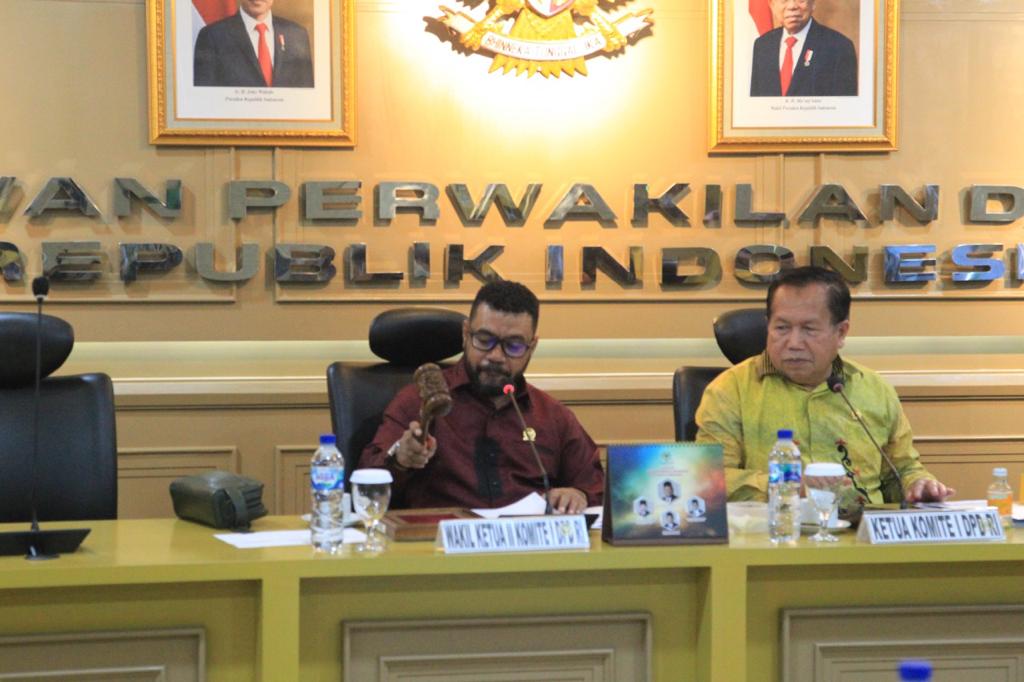Informasi Seputar Kegiatan di DPD RI
AGENDA KEGIATAN
DEWAN PERWAKILAN DAERAH REPUBLIK INDONESIA
18 January 2023 oleh admin
JAKARTA, dpd.go.id - The birth of the Job Creation Law has opened enormous opportunities in the investment space. The World Bank report stated that the impact of the implementation of the Copyright Law began to be felt in the second quarter of 2022, when there was an increase in the number of Foreign Investment (PMA) in Indonesia. This was agreed by the Investment Coordinating Board (BKPM).
BKPM reported that investment realization exceeded IDR 307.8 trillion in the third quarter of 2022. This figure rose 42.1% compared to the same period in the previous year. Of the investment realization value, it is known that 54.9 percent or IDR 168.9 trillion are FDI. Meanwhile, around IDR 138.9 trillion or 45.1 percent is Domestic Investment (PMDN).
Responding to the opening of this investment, West Papua Senator Filep Wamafma, gave his views. According to him, investment is a necessity in the era of openness and globalization. But investment growth must not negate humanity.
“All countries in the world of course need investment. Papua as an Otsus (special autonomy) area also needs investment. However, investment cannot be separated from human values. So that humanity must be above all investment policies. Moreover, don't let investment demean human dignity, especially the dignity of native Papuans, whose land and forests have been the object of investment," said Filep, Tuesday (17/1/2023).
"We do not refuse investment. What we remind you is that there should be no criminalization in the name of investment," he said again.
Furthermore, the Vice Chairman of Committee I DPD RI then highlighted the problems experienced by the Papuan people because of the influx of investment.
"There are two things I want to emphasize here. First, there should be no criminalization of regional officials who for the sake of their people prohibit investment. Considerations from regional heads are absolute for making investment decisions, even for National Strategic Project (PSN) investments," he said.
“That's because regional heads are legally and morally responsible to the people they lead. In my opinion, this is not defiance, because in a democracy, what is needed is a logical dialectic as to why investments are made in Papua or West Papua," said the author of the book Investment Policy Arrangements in the Context of Protection of the Rights of Indigenous Peoples in West Papua Province.
The second point, Filep emphasized the criminalization of indigenous peoples. He said, throughout 2019, the records of the Indonesian Legal Aid Foundation (YLBHI) stated that most indigenous peoples experienced criminalization, including in the form of accusations of being the perpetrators of forest fires.
"This is interesting because the accusation directly wants to eliminate the position of indigenous peoples as the giver of permission for investment in their customary territories. Not to mention if we talk in the context of indigenous peoples in Papua. The issue of compensation also has to go through a tough and long debate and makes indigenous peoples seem powerless before the state," said Filep.
In this regard, the former member of the Special Committee for Papua then underlined the government's role in investment. According to him, the government must not ignore the voices of regional heads trying to protect their people from investment, especially the voices of indigenous peoples who oppose investment.
“The government is very committed to the Sustainable Development Goal's or sustainable development goals. This goal should be a guide for all the facilities provided for the investment climate. This means that the voices of indigenous peoples, the voices of regional leaders who do not agree with the authoritarian attitude of government investment, should be accommodated. Don't all of them be seen as disobedient, or don't look for other problems so that these people experience criminalization in their lives,” said Filep.
“In my opinion, the complexity of such criminalization is caused by different perspectives on the values and norms held by indigenous peoples groups and certain regional heads, with the values held by the government. These different perspectives on values and norms influence the evaluation of the actions of indigenous peoples and regional heads. So, of course we don't hope that the investment will be used as an excuse for criminalization, because that is tantamount to negating human dignity,” said Filep ending the interview. (*)
AGENDA KEGIATAN
DEWAN PERWAKILAN DAERAH REPUBLIK INDONESIA
